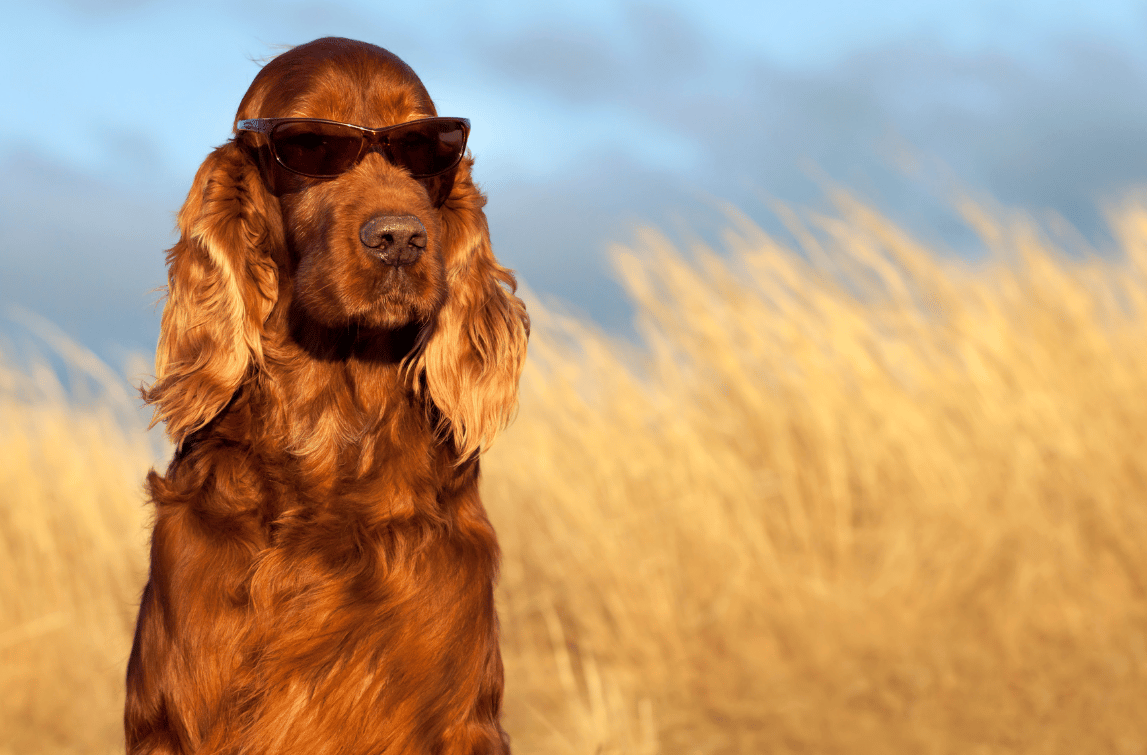
Our Top Summer Pet Safety Tips
Here’s our top tips for keeping your pets safe during the warmest months of the year!
Never Leave Your Dog Unattended In a Car
Over these warmer months it is important that you never leave your pet in the car, no matter what! Not only is it horrible to put your pet in this position but it is an offense. The SPCA have allocated a fine of $300 if they find your dog experiencing heat stress in an unattended car.
Signs of heat stress: Excessive drooling, panting, hyperventilation and shade seeking behaviors.
According to the SPCA when the outside temperature is 21 degrees the temperature in a car can exceed 31 degrees in less than 10 minutes and in 30 minutes it can rise up to 40 degrees and on hot days the temperature in the car can reach more than 50 degrees. These stats are based on a car parked in the shade with the windows down.
Dogs left in the car can experience heat stress (panting and increased thirst), heat exhaustion (heavy panting, weakness, are coherent but unable to act on it) and heat stroke (hyperthermia ).
Not only does the car heat up but a dog’s normal body temperature ranges from 38.3-39.2 degrees celsius and as humans our normal temperature ranges from 36.1-37.2 degrees celsius. Naturally, a dog’s body temperature is warmer than ours by at least 1 degree, meaning if we are warm our pets are always warmer! When we are hot our bodies sweat to help keep us cool but dogs have much fewer, located in their paw pads and nose so they tend to struggle to regulate their temperature through their sweat glands.
If you see a dog in a hot car, refrain from smashing windows though you might feel the need to, instead call the AA, Police or SPCA immediately, this could save their life. AA sees these situations as a priority and they will arrive as quickly as possible and free of charge (you do not need to be a member to receive this service).
AA contact number: 0800 500 222 or *222 (from mobile phones).
Find your local SPCA’s contact number here:
https://www.spca.nz/report-animal-cruelty
Police: 111
Beware of Grass Seeds
We are surrounded by grass seeds, especially this time of the year! Many people don’t know what a grass seed is or the huge risks they have on our pets if they go undetected.
What are grass seeds?
Grass seeds are also known as grass awns and they grow alongside wild grass/ dunes and can also be found on rye/barley. They can stick to our pets fluffy fur where if left alone they can burrow their way into the skin and cause infections and may require surgery to be removed. They can also be swallowed or inhaled, or enter our pets via their ears and eyes and can cause infections that way. If left untreated they can lead to serious injury and in some cases can be fatal.
How do I protect my dogs against grass seeds?
In the Tauranga area, they are commonly found amongst our sand dunes but can also be found amongst long grass, around farms and parks. So avoid walking your dogs in these areas if you can, for example, stick to the sand if you’re walking your pooch on the beach.
Knowing what they look like and identifying the grass seeds is very important because then you know to avoid that area. Here is a picture of what to look out for. They are small little barbed seeds,
Keeping your pet’s fur short will be a relief from the summer heat and also makes the grass seeds easy to spot and less likely they will latch on. Long hair breeds are more susceptible, but all breeds can be affected, even cats.
I would also recommend you do a full body check of your dog after walks, making sure to check between the toes, ears and armpit areas. If you find any, remove them as soon as possible. The earlier you catch them the less likely your pet will require surgery.
How do I know if my dog is affected?
Over the summer months, there is an increase in animals who come to veterinary clinics with grass seeds. Most people notice their dogs to have a limp, excessive licking or a swollen, red lump on them. You may have noticed grass seeds getting stuck to your socks or pants and you can feel the sharpness of them and it is hard to remove them as they are lodged right in there. Because our pets are covered in fur, the grass seeds stick to them very easily and can start to pierce the skin and they wriggle deeper and deeper and can cause serious pain and discomfort if left untreated.
Slip, Slop, Slap and Splash
The Cancer Council came up with the well-known “slip, slop, slap” slogan which relates the importance of sun safety for us and I think it is equally important that we have a version for our pets!
Slip them into the shade whenever possible even if only for a brief period of time. Keeping them out of the sun is the best sun protection we can give them. It reduces the risk of sunburn (skin cancer), heat stroke, and will just keep them at a more comfortable temperature. When out and about, bring shade along for example an umbrella or a gazebo. You can also slip them onto a cooling mat or into a cooling jacket.
Slop on some sunscreen. Pet sunscreen is mainly used for our hairless pets or pinky/white-skinned pets as they are more prone to sunburn, which like us, can lead to melanoma/skin cancer. It is important to use sunscreens that have been approved for pet use as some human sunscreens can be toxic to our pets if ingested. Here at Vet Post we have a range of pet friendly Sun Block.
Slap on some protective shoes when walking your pet on the hot concrete or on the hot sand.
Or walk your dog in the morning before the sun has a chance to heat up the ground, or in the evenings after the sun has gone down. In the heat of the sun it is easy for our pets to become exhausted a lot easier so limiting exercise in the heat is important and will reduce the risk of heat stroke/ heat exhaustion.
Splash fresh water daily and sometimes more often. Water must always be available to your pets and as the temperature gets warmer our pets thirst will increase and the water may need to be changed more frequently so it is important that you keep an eye on the water bowls, it is also important that the water bowl is placed somewhere that isn’t directly in the sunlight. While on the topic of splash, it may be obvious but if your pets are swimming or around water it is important that they are always supervised. If you find your pet is struggling in the summer heat and no amount of breeze or shade will keep them from panting it is a good idea to give them a good splash of water and wet their fur to help keep them cool. Frozen snacks can also help to keep them cool.
Wishing you and your pets a safe and fun summer from the team at Vet Post!

STILL HAVE QUESTIONS ON THIS TOPIC?
Call us on: 021 838 746 (Monday to Friday 9.00am to 4.00pm)
Email us at: [email protected]
Why shop online with us?

Discounted Prescription Medicine
VetPost offers easy & affordable pet medication for a happier, healthier pet.

New Zealand Owned & Operated since 2014
Guaranteed quality and service with VetPost, our vet Dr Rebecca Penman is always here to help.

Shop online, anytime.
Our products, services & specials are all at your fingertips. Buy online, delivered straight to your door.

2 Comments
Good tips especially about grass seeds. We have a Shih Tzu and he loves rolling around in the grass when we’re out. I groom him every day so usually find anything caught in his hair within a couple of hours of our morning walk but the other night I found a grass seed under his arm which, fortunately, I was able to pull out of his hair before it became embedded.
Very helpful, thank you!